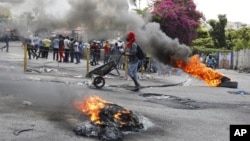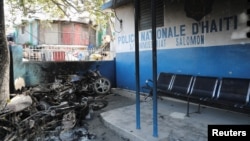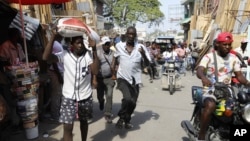Haiti's main port was closed on Thursday after an attack by armed gangs, said the port operator, Caribbean Port Services.
CPS said "malicious acts of sabotage and vandalism" led to the decision after armed men broke into the port and looted containers, Reuters reported, citing local media.
The United Nations said the port "is currently the only means of transporting food and medical supplies for humanitarian and development organizations from Port-au-Prince to other parts of the country."
Earlier Thursday, the government extended a state of emergency and nighttime curfew, as gang violence continued to escalate in the capital, Port-au-Prince.
The government says it is taking the actions to "reestablish order and take appropriate measures to retake control of the situation," as scores of people died this week as allied gangs seek to take power.
The curfew has been extended until March 11 and the state of emergency has been extended until April 3, according to Haiti's official gazette.
The state of emergency was initially announced by authorities on Sunday, when armed gangs helped thousands of prisoners to break out of prison and tens of thousands of people fled the capital violence.
The state of emergency bans public protests and allows security forces to use "all legal means" to enforce the curfew. Among those excluded from the curfew are some journalists, security forces and emergency services.
The U.S. has sent a security team to protect the U.S. Embassy.
Despite the curfew imposed over the weekend, gangs continued to attack police stations, setting at least 10 on fire, the police union said.
The situation in Haiti took this violent turn after Prime Minister Ariel Henry announced last week at a meeting with Caribbean leaders that general elections would be held in 2025.
After the meeting, he went to Kenya and met with President William Ruto. During the meeting he urged the president to provide support from a U.N.-backed Kenyan police force, which a Kenyan court has ruled is unconstitutional.
While he was traveling, gangs attacked and effectively shut down Haiti's international airport to prevent him from returning to the country. Many of them are frustrated with Haiti's lack of an election in nearly a decade and the fact that Henry was never elected.
Henry landed in Puerto Rico on Tuesday after being denied entry into the Dominican Republic and is now seeking another way into the country.
U.S. Secretary of State Antony Blinken spoke to Henry on Thursday, urging him to speed up a transition to a new government.
According to prominent gang leader Jimmy "Barbeque" Cherizier on Tuesday, "If Ariel Henry doesn't step down, they will lead us directly into a civil war that will end in genocide."
Violence in Haiti killed about 4,700 people last year, according to United Nations estimates. In Cite Soleil, a part of the capital hit particularly hard by violence, 2,300 people were killed in 2023, Doctors Without Borders said on Thursday.
The death rates in Cite Soleil alone are similar to those in Syrian war zones and among Rohingya refugees from Myanmar, it added.
With Henry away, police forces are struggling to contain violence because of limited resources.
On Wednesday, the Caribbean Community issued a statement saying that leaders had met many times but still have not reached a consensus on how to handle the conflict.
The statement said Haitian stakeholders are being urged to reach a consensus, given the importance of a "Haitian led and Haitian owned" solution.
Some information for this report came from The Associated Press, Reuters and Agence France-Presse.







